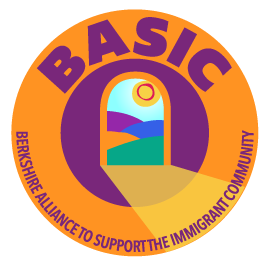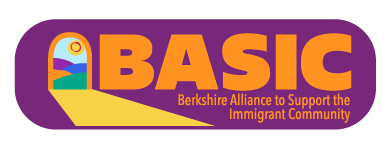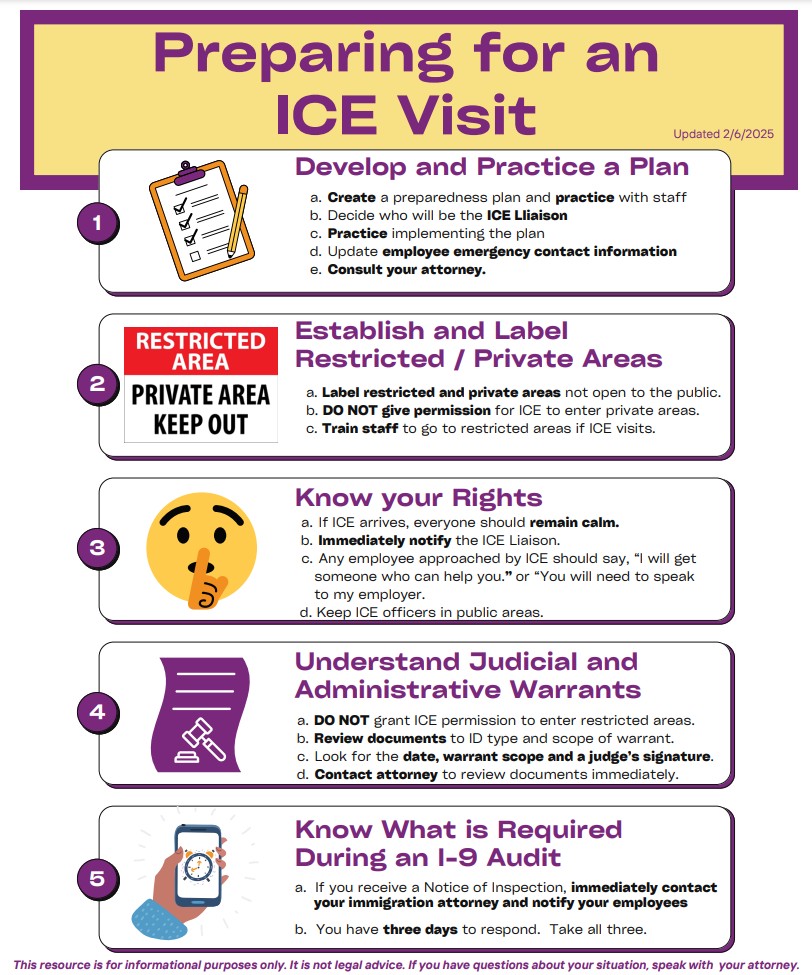For Berkshire Businesses and Organizations
Supporting and
Protecting Immigrant Employees and Clients
The information and resources shared on this page, designed by a subgroup of BASIC, aim to assist Berkshire area businesses and organizations in supporting and protecting their immigrant employees and/or clients. This page includes information on preparing for a potential visit from Immigration & Customs Enforcement (I.C.E), as well as best practices for supporting immigrant employees. Please refer to this page from time to time for updates and relevant additions.
HOW TO BE PREPARED
To conduct your own in-house preparation plan, we recommend the following steps:
- Review BASIC I.C.E Preparedness packet. (linked below)
- Create a plan for your business/organization. (Packet provides guidance on how to create a plan.)
- Ensure all elements of the plan are considered (Do you have a designated and labeled PRIVATE space? Do you have a system to alert your team? Etc.)
- Interested in working with knowledgeable peer coaches once you have a site-specific draft of an individual ICE Preparedness plan? Reach out to [email protected] to request a Zoom session with experienced peer coaches. We can meet with your leadership team and hear your plan, answer questions, and help you revise your plan as needed based on your site, current policies, and current ICE interactions.
- Make a plan to inform your team/staff about your ICE Preparedness Plan and practice as needed.
- Stay aware of updates and changes to policies and actions, and update your plan as needed.
If you would like to request members of the BASIC community, come to your organization to conduct a training or host a questions & answer session with your team, please contact us at [email protected].
Preparedness Training Links
¡Próximamente versiones en español!
Additional Resources
Berkshire Immigrant Center
141 North Street, Pittsfield, MA
413.445.4881
https://www.berkshireic.org/
MIRA: Massachusetts Immigration & Refugee Advocacy Coalition
https://miracoalition.org
MIRA’s: Know Your Rights one-pager
What Immigrants and their Employers Need to Know before an ICE Arrest
Immigrant Legal Resource Center (Red Card available in many languages!)
(**Order a set of 250 for $50)
https://www.ilrc.org/red-cards-tarjetas-rojas
American Civil Liberties Union (ACLU)
https://www.aclum.org/en/know-your-rights
https://www.aclum.org/en/know-your-rights/know-your-rights-if-you-arequestioned-about-your-immigration-status
Indivisible Nation
https://www.nokings.org/signs
‘Know Your Rights 4 Immigrants’ App!
Available in 16 languages, it can read your rights out loud to an I.C.E or law enforcement agent and send a message to an emergency contact. It has other resources, such as the ability to look up a consulate and a sample family preparedness plan.
Available for both iPhone and Android phones.
iPhone: https://apps.apple.com/us/app/know-your-rights-4-immigrants/id6740367633?platform=iphone
Android: https://kyr-4-immigrants.en.aptoide.com/app
SUPPORTING IMMIGRANT EMPLOYEES
Beyond preparing for the threat of immigration enforcement actions at your business or organization, this is a good time to consider other ways you may be able to support immigrants on your staff and in our community.
Best Practices for Supporting Immigrant Employees:
- Be clear about work authorization requirements on job postings. Different types of jobs, such as employment positions and independent contracting positions, have different documentation requirements. If your business participates in E-Verify or otherwise requires work authorization, specify that on the job posting so applicants know what to expect.
- Be clear about language requirements on job postings. For example, if the job requires conversational English but not academic written English, specify that so applicants know whether they are qualified to apply.
- Do not add job requirements that are not necessary. Historically, a position at your organization may have required fluent English, for example, or a bachelor’s degree, but think about whether those requirements are still necessary to excel in the job. Many local employers are finding that they can more easily attract the talent they are looking for when they relax outdated requirements and focus on what is really necessary to excel in the position.
- Value and promote multilingualism in your staff. We live in a multilingual county and having staff members who speak languages other than English can open up an entirely new clientele for your business. Many local employers advertise a bump in salary for multilingual applicants to build a multilingual workforce.
- Consider initiatives to promote language learning. Some employers in Berkshire County already partner with English language programs, such as Berkshire Community College’s Adult ESOL Program, Literacy Network, Literacy Volunteers of Berkshire County, to train new employees who are learning English in the language skills necessary for their new job. Consider whether you could implement a similar program to attract new talent. At the same time, some employers offer support for those who only speak English in learning a new language. Consider whether this could make sense for your business.
- Consider employment visa sponsorship. Perhaps the most important concrete action you can take is looking into whether you can sponsor employees in vulnerable immigration statuses. Due to a 2024 federal policy change related to D-3 waivers, even those who are fully undocumented may be able to benefit from employment sponsorship. Learn more here.

WE ARE BASIC
B-A-S-I-C stands for Berkshire Alliance to Support the Immigrant Community. BASIC was formed to support the Berkshire immigrant community shortly after the 2016 presidential election. Ilana Steinhauer, Neil Hirsch, and John Nelson organized the initial meetings. They sought to bring together the agencies that serve immigrants in Berkshire County. BASIC is currently the only convener that meets across sectors with the focus on immigrants in our community.

